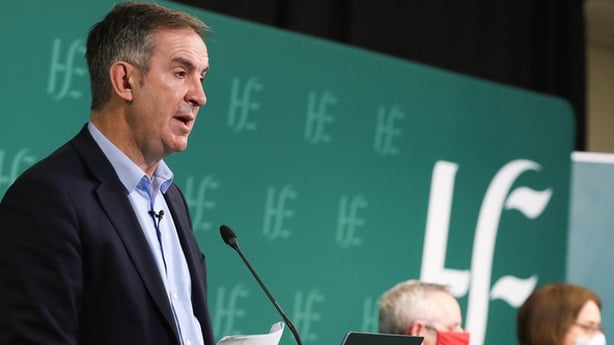There are 654 admitted patients waiting for a bed in hospitals around the country, according to the Irish Nurses and Midwives Organisation, up from 640 yesterday.
The INMO said that this morning there 446 patients waiting in emergency departments, while 208 were in wards.
It has called for all non-urgent elective procedures to be cancelled as overcrowding is leading to "very dangerous situations for patients and nurses".
The hospitals worst affected are University Hospital Limerick with 110 patients waiting; Cork University Hospital with 88; University Hospital Galway with 65 and 50 at Letterkenny University Hospital.
There were also 11 children waiting for a bed at the three children's hospitals in Dublin, down from 27 yesterday.
University Hospital Limerick is curtailing elective procedures this week in an effort to increase bed capacity and is using beds in its day surgery ward and cardiology day ward to deal with surge capacity.
Meanwhile, Cork University Hospital also recorded its highest number of emergency department presentations on Monday and today the INMO reported there are 88 admitted patients waiting for beds in the hospital.
Speaking on RTÉ's News at One programme, INMO representative for CUH Colm Porter said this is a cyclical process that can almost be predicted every January, every time peak flu season is reached there is "an extreme level of patients on trolleys".
Mr Porter said in CUH admitted patients can be waiting for up to 13 hours on a trolley depending on their circumstances, but that the main issue is the "sheer number" who are waiting - people who are sick enough to be admitted to hospital "but there is simply no appropriate space for them" to be cared for.
He said the lack of community beds in Cork city is a "serious concern" for the INMO.
"CUH has the highest levels of delayed transfer to care in the country which means that there are patients within CUH who could be discharged but there's no suitable bed for them to go to," he said.
"You can't single out just one hospital, it's a complete system failure of the nurses, the midwives, and also the patients who are presented for care in CUH," he added.
The UHL group said it does not schedule any elective procedures at any of its six hospitals in the first two weeks of the year, as it is the busiest time for the hospital.
Elective surgery is being reviewed on a daily basis, but only time critical cancer and cardiology surgery is currently taking place.
The HSE said many hospitals are experiencing very high levels of activity including in Tallaght, Galway and Letterkenny hospitals.
The HSE's figures for people waiting on a bed today differ from the INMO's. The HSE data takes in those waiting on trolleys as well as people in 'surge beds' who are waiting on a bed in a ward. Today's figures from the HSE are 491 on trolleys as well as 464 in surge beds, amounting to 955.
Read more: Why do the HSE and INMO trolley figures differ?
HSE Chief Operations Officer Damien McCallion said some hospitals are experiencing record attendances this week amid increases in respiratory illnesses, with the Executive advising people to consider all other options before seeking acute hospital treatment.
Speaking on RTÉ’s Morning Ireland, he said during the past six-week "respiratory period" there has been an improvement in hospitalisations, but this week some hospitals are experiencing record attendances.
He said that anyone who has a minor injury should attend other facilities, but if it is an emergency situation to go to the ED or call 999 or 112 for the ambulance service.

The HSE is using all available facilities, he said, to keep the flow moving in the system and minimise the impact on people.
Mr McCallion said each hospital has a surge plan where they focus on trying to alleviate those pressures and move patients as quickly as possible to a bed, as well as discharge patients to an appropriate setting.
He added: "But what we're seeing at the moment is record attendances in some locations and as a result, all of those efforts are being redoubled to try and make sure we keep the flow moving in the system and hence we minimise the delays for patients that have been triaged."
During this period, he said, fewer elective procedures are taking place, but time-critical and trauma surgeries are carried out.
Amid the surge in attendances, the Government has been accused of not helping people when it comes to hospital care.
Speaking during Leaders Question in the Dáil, Labour leader Ivana Bacik said the Government's policies are hurting people.
"Every week we all hear healthcare horror stories, we hear from patients detailing awful experiences... from people with complex medical needs who are afraid of getting sick if they go in to hospital," she said.
"The staff at UHL deserve so much more than to have to work under those conditions - and patients and their families deserve better too," Ms Bacik said.
"There is no more give in the system, Taoiseach," she added.
Taoiseach Leo Varadkar responded by acknowledging there are "far too many people waiting far too long" to get the treatment they need.
Mr Varadkar said huge progress had been made in recent years, and that since 2020, more than 20,000 staff had been recruited.
"We're now in the top five in terms of practicing nurses per head of population in the OECD," he said, adding that overcrowding was not as bad as previously.
Additional reporting: Cathy Halloran
